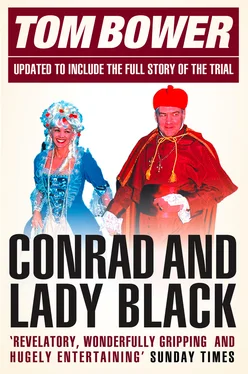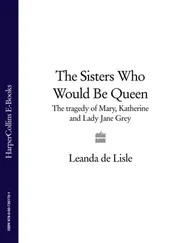Privilege and prejudice had been Conrad Black’s roots since his birth in Montreal on 25 August 1944. By the age of five, when the family moved to Toronto, he was cosseted by cooks, butlers, nannies and chauffeurs. In the winter holidays he escaped Toronto’s freeze in the Bahamas. At Nassau’s Porcupine Club he gazed with his father at the Mellons, du Ponts and other American magnates. Although George Black did not rank among the super-rich, he was a successful businessman with an astute intellect. Well-read, and always irritated by those who misused the English language, he noted his son’s exceptional gifts and became preoccupied with creating an extraordinary individual out of him.
Obsessively he ordered Conrad to recall facts, both relevant and irrelevant. After intensive games of chess, his son was encouraged to read encyclopaedias and, like himself, recall what he read. Conrad’s bedrooms were filled with books about the military, wars and politics. He learned not only the names of the world’s ships, both commercial and naval, but their weight, armour thickness and guns. In the midst of the Korean War Conrad Black sat transfixed listening to David Brinkley’s news broadcasts, and watched the television reports of the McCarthy hearings in Washington targeted at unearthing Communist sympathisers. Influenced by his father in favour of capitalism, he grew up with a hatred of those on the left, whom he later damned as ‘phoney, envious and mediocre bleeding hearts whining and snivelling about meritocratic Darwinism’. Nowhere in Black’s education or experience was there any sympathy for the anonymous, simple, honest masses born underprivileged and without special talents. On the contrary, there was boastfulness when in 1952 his father arranged his purchase of a single General Motors share costing $59. The eight-year-old Black had dollar bills spilling from his pockets. When one fell into the mud, he carefully washed it. His journey across the Atlantic on the Queen Elizabeth the following year to watch the coronation in London enhanced the image of a spoilt child taking luxury for granted.
From the age of eleven the unsporting, overweight Black was driven every day to Toronto’s Upper Canada College, one of the country’s elite private schools, in a chauffeur-driven Cadillac. Awkward and isolated, he was not a natural enthusiast for a society focused on conformity and obedience. During his school day he could be certain that his family’s servants were cleaning his room, washing his clothes and preparing his dinner. Occasionally the chauffeur returned to serve lunch in the limousine. Voices, books and images conjured up for the young Black a romantic fantasy of enjoying the same unlimited power as history’s titans, assured that whatever he willed would be carried out. Entitlement bred defiance and insolence, fashioning a personality which enjoyed a fight and savoured inflicting defeat. Black’s childhood, remarked John Fraser, a school friend, was like prison for a pre-teenager convinced that he was smarter than the system. 8
The scoffs directed at the tubby outsider, Conrad believed, were driven by ‘spite and envy’, one of the oft-repeated phrases that encapsulated his life’s credo. His encyclopaedic knowledge, he assumed, was resented, reinforcing his sense of superiority and hatred of regimentation. He construed his teachers as remote from reality, and their authority as a misuse of power. History, he believed, showed how those exercising authority were flawed. Success was won by those who were unwilling to obey laws. Those who failed to admire him were dismissed as despicable. Teachers whom he judged to be inferior excited his contempt. Defiance, in Black’s interpretation, showed courage. His insolence did not pass unpunished. Regularly he received corporal punishment on his backside or hands with rulers, slippers and even a riding crop. The ‘official terror’, he later recalled, imposed by flagellators, homosexuals and failures transformed him from a ‘sceptic to a rebel, an insurrectionist and an anarchist’. 9
There was equal hatred of his fellow pupils who succumbed to the teachers’ tyranny. Black promoted himself as the spokesman against the sadism of his inferiors. ‘This school is like a concentration camp,’ he told John Fraser in the midst of a typical fury. ‘E.P. Taylor could buy this silly place fifty times over. He’d subdivide and make some money off it.’ Fraser and others were baffled by Black’s anger. Life at Upper Canada was little different from that at other schools. The school’s summer camp motto: ‘In the boy is seen the man’ – would prove to be remarkably pertinent.
In May 1959 the school was being rebuilt, and the fourteen-year-old Black spotted lax security in the administrative offices. One night, with little consideration of the consequences, he returned to the building and picked the lock of a room containing the records of the cadet corps. In the hope of avoiding military duty and sport, he removed his own records. On a subsequent night he broke into the room of a teacher whom he particularly disliked and altered the records of some pupils, and in another break-in he copied out the academic records of many pupils. His success bred an outrageous plot to steal and sell the school’s final examination papers.
With two other pupils, he broke into the school’s main office, pocketed the examination papers and used his knowledge of other students’ weaknesses to offer them the relevant papers for an appropriate price. Those in greatest need paid the most. With an exaggerated sense of his own skills, the trademark of any buccaneer, he was excited by the risks he was running. He staked everything on an attempt to demonstrate his bravado and his uniqueness. Thirty-four years later, he would proudly admit to having ‘completely undermined the system’ and to have caused ‘utter chaos’. 10 Blinded by contempt to the possibility of any flaws in his genius, his last throw was calculated to extract revenge for his injured innocence. He gambled that either the authorities were too stupid to discover his deeds, or that his expulsion would be a painless pleasure.
The extraordinary examination results that followed provoked questions, and Black’s role was discovered. Expulsion was inevitable. He felt no shame, and resisted accepting any blame. He dismissed the school’s principal as an ‘insufferable poltroon’, and derided his wife, whose parting words were that his ‘life was over’, as a ‘desiccated old sorceress’. 11 He consoled himself that he had received ‘much moral authority by my failure’, and even John Fraser felt that he was ‘the hero of the hour’. Later, Black described his crime as ‘a fundamental subversive’ plot intended to undermine and overthrow a regime which he compared to that of Nazi Germany. His contempt for those pupils who had exposed his dishonesty matched his scorn for those who were outraged by it. The boys who had bought the stolen papers had wasted their money, but the honest students were also forced to retake the examinations. Black’s condescension towards the innocents, combined with a genuine grievance against those who burnt his effigy on the lawn outside his home, reflected his cavalier arrogance. ‘As I walked out of the gates,’ he wrote self-servingly thirty-four years later, ‘a number of students who literally twenty-four hours before had been begging for assistance – one of them on his knees – were now shaking their fists and shouting words of moralistic execration after me. I’ve never forgotten how cowardly and ungrateful people can be.’ 12 He blamed the teachers, the school and the system, denying any personal responsibility for his wrongdoing. On the Day of Judgement, Black expected those vilifying him to have to answer for their lack of faith in himself. He was entitled to their praise, not their scorn.
Читать дальше












